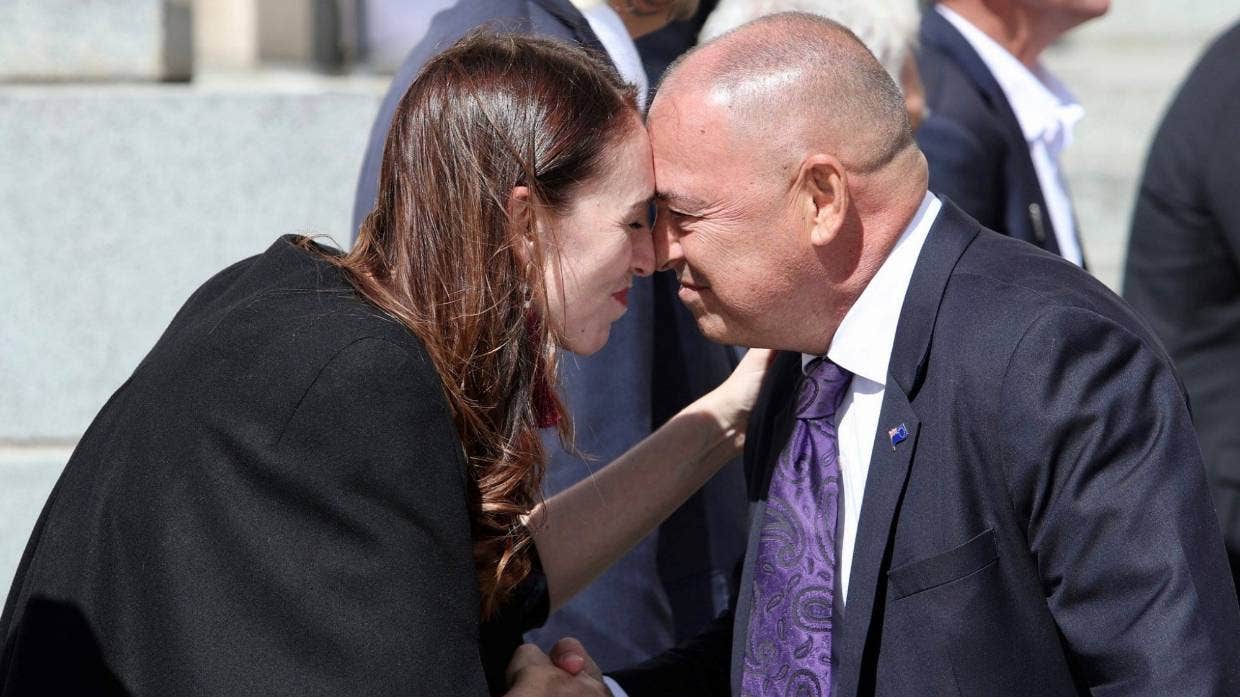Cooks entitled to NZ aid fund
Saturday 4 December 2021 | Written by Supplied | Published in Editorials, Opinion

New Zealand Prime Minister Jacinda Ardern and Cook Islands Prime Minister Mark Brown perform a hongi at Auckland War Memorial Museum last year. RYAN ANDERSON/STUFF/21120331
Nothing brings out the racist underbelly of Aotearoa and its dirty underside more than when countries like our own, realm countries of New Zealand, receive aid, writes Thomas Tarurongo Wynne.
This announcement was met on social media with numbers of Kiwis, reminding our country that these are New Zealanders tax payers that are fitting this bill, or that once again New Zealand has come to the aid of the Cook Islands. Some went further by asking why this money was not being spent in Aotearoa and why it was spent on this tiny little country that many only see through the lens of glossy beachfronts and tourists allure as opposed to the home that it is for us all.
Mutual benefit, that’s how I would describe our relationship with Aotearoa. Hard for some to imagine, I know, especially those of the persuasion that “we should be so lucky” though they may have missed a number of key aspects of our history and engagement as countries separate but joined at the Constitution. As the First World War raged, Sir Maui Pomare promised then premier of New Zealand Richard Seddon 500 men from the ranks of Maori. His aspirations were met with resistance from Maori in the Waikato and in other regions that refused to fight for a king that had confiscated their land and decimated their people.
With his numbers falling short his sights were set over the Pacific where recruiters were told to lower the age and height restrictions for papa’a soldiers and the now infamous 500, from the Cook Islands, Niue and surrounding Pacific countries became a part of military and national history. Our fervour to join the war effort was met with the thinking that our men initially were not fit for combat and would take ancillary roles. This position slowly changed over time though many were armour and munitions carriers, and a role they did with great pride and courage.
In 1940s, although a part of New Zealand, and New Zealand citizens, we needed written permission to leave the country and migrate to New Zealand from the resident commissioner. Many including my great Aunt Ngavaine Mamanu would leave to take up services as a house maid, leading to the exodus of many more in the 1950s and 1960s. My grandfather Teavae Tarurongo would leave first and make his way to Wellington and over the next few years my grandmother Arascena Teavae and our whole family would make the move like so many families did during that time.
Lured by a buoyant New Zealand economy and a labour shortage, factories, freezing works, car assembly plants and forest mills sought workers and from our homelands they came. Their contribution to New Zealand has never been measured but the sheer numbers, paying taxes, building homes and propping up the New Zealand economy of the 1950 and 1960s cannot be underestimated.
We now have close to 100,000 Cook Islanders resident in Aotearoa, paying taxes, and contributing to the New Zealand economy. So when we look at aid being delivered to our home land, we can feel confident that our people have contributed to that aid and many in jobs that others simply would not do. Our contribution to the New Zealand economy continues, with little leaving Aotearoa in remittance where Samoa has 24 per cent of its economy sent from its people overseas and in Tonga 43 per cent in 2019. For the Cooks this is not the case, as we generally accumulate our money or asset and then return and build our family homes or develop them.
Our country prior to Covid-19 would spend up to $200 million a year on New Zealand products and then import them. That’s right we injected up to $200 million a year into the New Zealand economy, let alone the $12 million we spend up front so Air New Zealand will simply agree to land in our country, while our Air New Zealand staff are paid well below their New Zealand counterparts.
For us as Cook Islanders we can hold our heads up high that we contribute considerably to the New Zealand economy and have done so since the 1940s in labour and when we provided oranges, pineapples and fruit, with Greggs Raro being the legacy of that relationship. Any suggestion that we should be so lucky is ill informed and generally a mild case of racism or simply the undertones of settler colonialism, that should be held to account anytime it appears, be it in print or in conversation. We have a Cook Islands Cabinet Minister and three Members of Parliament in New Zealand, with many in lead roles in government and the private sector including the Governor of the Reserve Bank Adrian Orr, who is a proud Atiuan. What should be clear is that our contribution as Cook Islanders to New Zealand, its economy, its governance and leadership, is something we can all be proud of especially when some of that contribution makes its way home.














































